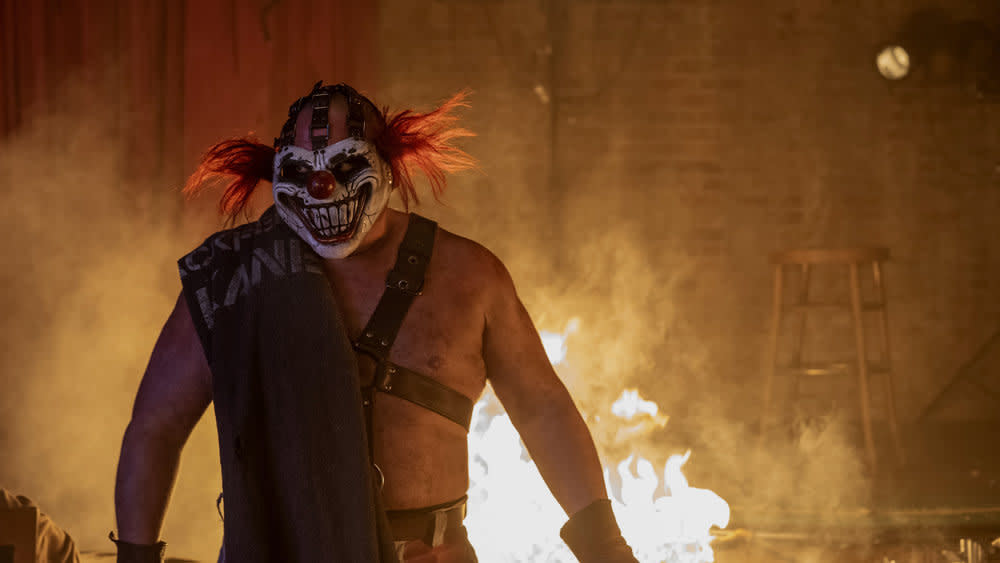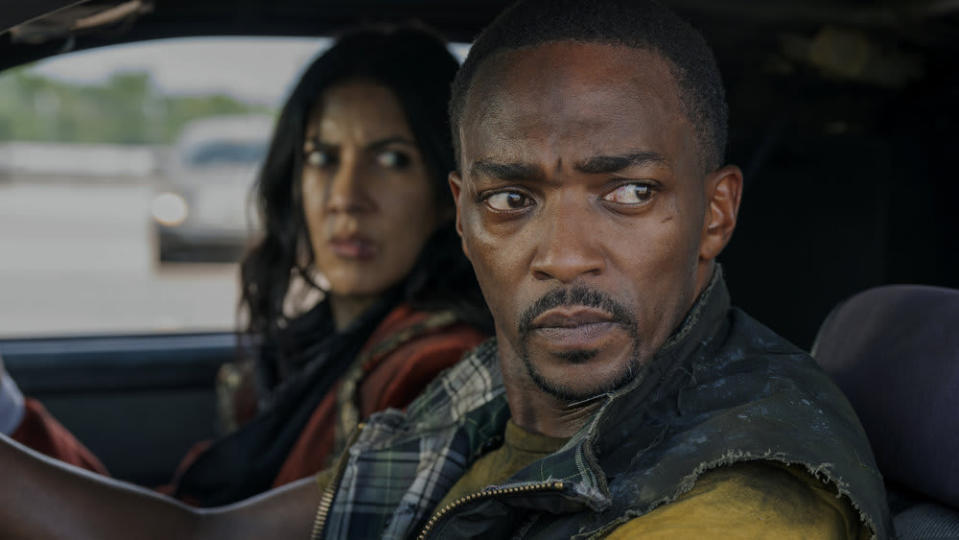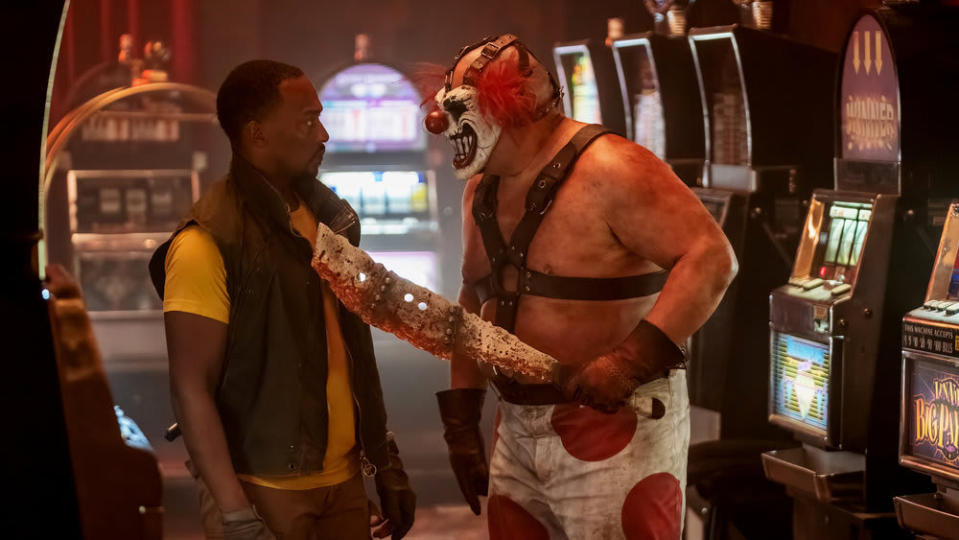‘Twisted Metal’ Ruins a Popular Video Game With Juvenile, Unbearable Mayhem

- Oops!Something went wrong.Please try again later.
- Oops!Something went wrong.Please try again later.
Six months after The Last of Us proved that video games can make for compelling screen drama, Twisted Metal arrives to confirm those old suspicions about the two medium’s fundamental incompatibility. An aggressively unfunny adaptation of a one-dimensional decades-old PlayStation franchise that few still care about, Peacock’s R-rated action-comedy breaks down from the start and never recovers. Peddling lame gags and lamer action, it’s a clunky trip not worth taking.
As a game, Twisted Metal was a gonzo demolition derby between various wannabe-outrageous vehicles outfitted with deadly weapons, and its primary appeal (if one existed) was allowing friends to battle each other in multiplayer. Rhett Reese, Paul Wernick and Michael Johnathan Smith’s 10-part half-hour series (premiering July 27) naturally provides no such thrills, instead falling back on post-apocalyptic clichés and dreadfully exaggerated humor and performances to tell a tale of one hero’s journey to traverse an American wasteland in order to achieve his dream. The best that can be said about the show is that it captures the over-the-top early-2000s-style “twizted” tone of its source material. Unfortunately, that attitude turns out to be borderline unbearable.
Twisted Metal’s protagonist is John Doe (Anthony Mackie), who—per his name—has no memory of his past and longs for the family he only knows via a burned-up photo. John is a futuristic courier known as a “milkman” (as denoted by his “got milk?” bumper sticker) who drives from one walled-off city to another in his beloved 2002 Subaru named EV3L1N, cracking jokes with a gleefulness that doesn’t translate to actual laughs. Mackie mugs with a total lack of inhibition in an attempt to turn John into the coolest cartoon in this comic world, his smile as big and goofy as his one-liners are groan-worthy. The effort is so strained that it instantly grates, and the result is that the entire series pivots around a smug, superficial character who’d be better off—to use a term that eventually refers to his souped-up ride—as roadkill.
John gets the opportunity of a lifetime when Raven (Neve Campbell), the leader of New San Francisco, offers him his greatest wish: to live on the “inside,” where citizens are safe from the criminals who were cast out into the wider, wilder regions of the nation upon civilization’s collapse. The catch is that Raven first wants John to travel across marauder-infested territory to New Chicago to retrieve a very important and mysterious package. John knows that this is a possible suicide mission, but he’s so desperate for security, and a place to belong, that he accepts the proposition, blind to the reality that Raven’s happily-ever-after fantasyland is an obvious illusion masking ugly, scary secrets. Thus, while incessantly talking to his beloved car, whom he anthropomorphizes into a girlfriend-mother-best-friend, he heads out on his odyssey, guided only by a crude map and a surplus of cockiness.

In short order, he crosses paths—more than once—with a nine-fingered stranger whom he dubs Quiet (Stephanie Beatriz) because, at the beginning of their partnership, she refuses to speak. Her silence turns out to be preferable to her dialogue, which mostly amounts to a lot of expletive-filled tirades directed at John. Quiet is on the hunt for evil Agent Stone (Thomas Haden Church), a former mall cop-turned-sadistic lawman who wants to control America through the use of blockades, and who forced Quiet’s brother (Richard Cabral) to kill himself during an early encounter. Quiet and John are reluctant collaborators, and their stock love-hate dynamic is almost as irritating as John’s arrogance, yo-yoing at regular, increasingly insufferable intervals between combative and affectionate. Moonlighting this most certainly is not.
Everything in Twisted Metal is “crazy,” if not legitimately hysterical. Its scripts are full of leaden jokes, whether they’re aiming for tongue-in-cheek audaciousness (like the sight of Mackie, after being hosed down, having his naked rear end sprayed with perfume) or pandering to gamers (such as a dreary Konami code reference). It strikes a pose that appears mainly designed to charm 11-year-old boys, replete with its oh-no-they-didn’t bloodshed, including gunshots, dismemberments, exploding bodies, and various other grotesqueries that are neither shocking nor amusing. That target audience may take to its dated mayhem, which sees John and Quiet contending with a variety of sub-Mad Max baddies while navigating dirt roads, gone-to-seed shopping centers and derelict casinos. Most others will likely find it a threadbare pantomime at best, and a maddening misfire at worst.

The only time Twisted Metal perks up is when it pits its protagonists against, or shifts its attention to, Sweet Tooth (played by Joe Seanoa, and voiced by Will Arnett). A psychotic bald behemoth in a leather cross-body harness, polka-dot pants and a clown mask, Sweet Tooth drives around in an ice cream truck and kills with deranged impunity. He’s the most iconic character from the Twisted Metal games, and his presence lends the proceedings a minor touch of maniacal personality. Sweet Tooth’s madness, alas, is usually as corny as the rest of the action, and though a flashback to his sitcom-actor childhood is one of the series’ few highlights, his insanity feels overly insistent and second-rate, and that’s before he takes murder-averse security guard Stu (Mike Mitchell) under his wing after the guy is betrayed by his best friend Mike (Tahj Vaughans) and his homicidal cop comrades.
There isn’t an interesting or witty performance in Twisted Metal, and it takes until its final installment for the show to stage an all-out multi-vehicle brawl—a too-little-too-late gesture that’s additionally marred by subpar CGI. Every location feels like a set and every outfit looks like a costume, and regardless of John and Quiet’s bickering, Mackie and Beatriz share scant chemistry, which goes a long way toward making the build-up to their romance, and the series’ late stabs at actual pathos, a chore. Then again, there’s almost no aspect of this fiasco that isn’t a misstep, from its cheekily employed 20-year-old rock and pop songs, to its various running gags, the worst of which is John’s clueless use of the word “Jell-O” to mean “goodbye.” To quote Quiet, it’s nothing short of “a fucking snoozefest.”
Liked this review? Sign up to get our weekly See Skip newsletter every Tuesday and find out what new shows and movies are worth watching, and which aren’t.
Get the Daily Beast's biggest scoops and scandals delivered right to your inbox. Sign up now.
Stay informed and gain unlimited access to the Daily Beast's unmatched reporting. Subscribe now.

